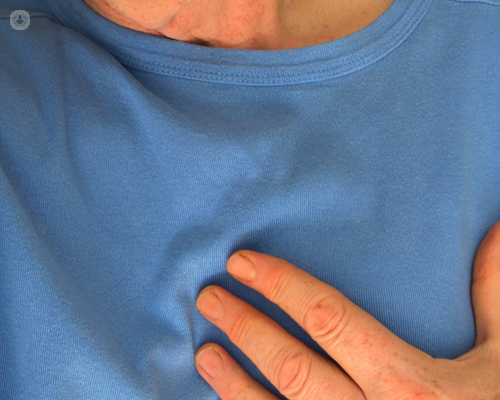Chest pain: When should I worry?
Autore:Chest pain can be alarming and is often associated with serious conditions such as heart attacks, but it can also stem from less dangerous causes. Understanding when chest pain is a cause for concern and when it may be less serious can help guide decisions about seeking medical attention. Here to tell us all about it, is leading consultant cardiologist Dr Christopher Broyd.

What are the most common causes of chest pain?
There are many potential causes of chest pain, ranging from mild to life-threatening. These can include:
- Heart-related causes: A heart attack or angina, which occurs when there is a reduced blood flow to the heart muscle, is the most concerning cause of chest pain. This type of pain often feels like pressure, tightness or squeezing in the chest, and may radiate to the arms, neck, or jaw.
- Gastrointestinal causes: Conditions like acid reflux or gastro-oesophageal reflux disease (GORD) can cause chest pain that mimics heart-related discomfort. This pain often occurs after eating and may be accompanied by a burning sensation or indigestion.
- Musculoskeletal causes: Strain or injury to the muscles and bones in the chest wall, such as from heavy lifting or vigorous exercise, can also lead to chest pain. This pain is usually localised and worsens with movement or pressure.
- Lung-related causes: Pulmonary conditions such as a pulmonary embolism (a blood clot in the lung) or pneumonia can cause sharp, stabbing chest pain, especially when breathing deeply.
When should I worry about chest pain?
Chest pain should always be taken seriously, but certain signs indicate a more urgent need for medical attention. Seek help if the chest pain is:
- Sudden and severe: If the pain comes on suddenly and feels like a heavy weight, pressure, or squeezing in the chest, this could be a sign of a heart attack.
- Radiating to other areas: If the pain spreads to your arms, neck, jaw or back, especially if it’s accompanied by shortness of breath, sweating, or nausea, immediate medical care is necessary.
- Associated with breathing difficulties: Chest pain that worsens with deep breathing or is associated with shortness of breath may indicate a serious lung issue, such as a pulmonary embolism.
- Unrelieved by rest: If the pain persists even after resting or taking medications like antacids, it may be heart-related and should be evaluated.
When chest pain might be less serious
Not all chest pain indicates a life-threatening condition. Chest pain that is mild, localised and feels sore or tender to touch, is more likely related to muscle strain or injury. Pain that occurs after eating or lying down, especially if it improves with antacids, is often related to acid reflux.
However, it’s important to remember that only a healthcare professional can properly diagnose the cause of chest pain. When in doubt, it’s always better to seek medical advice.
Are you worried about chest pain? Arrange a consultation with Dr Broyd via his Top Doctors profile.


